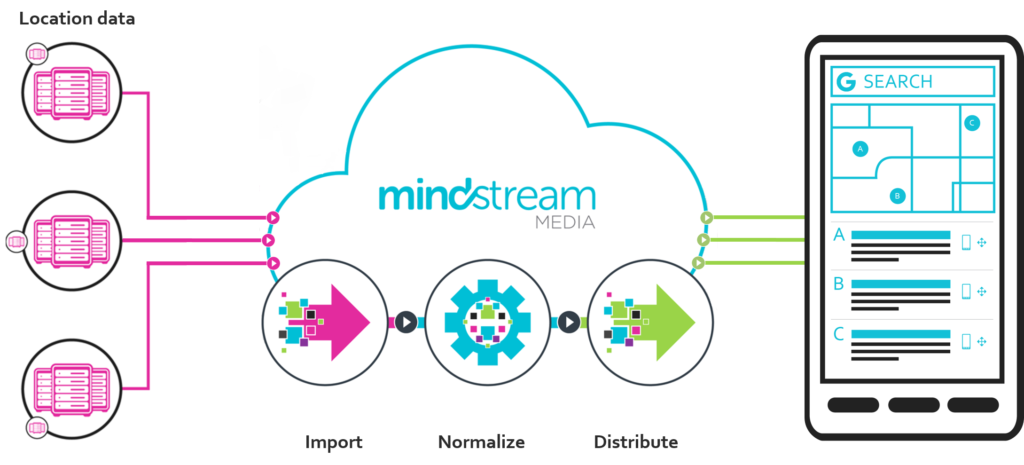The Best Way for Multi-Location Brands to Manage Local Business Data
Managing business information for individual locations is the foundation for any local digital marketing campaign. Updated and consistent location data ensures online users can find your brand’s storefronts, helps persuade consumers to visit your business rather than a competitor’s and improves the legitimacy of your business online to major search engines. If your online location data is inaccurate or inconsistent, consumers might get frustrated and take their business elsewhere, while search engines might get confused and rank your website lower in search results.
For brands with multiple brick-and-mortar locations, maintaining accurate and consistent local data can be as tedious and overwhelming as it is crucial; especially if you are dealing with hundreds or thousands of locations. Whether location data is managed at the corporate or franchise level, multi-location brands run into various obstacles that make it difficult to collect accurate and complete location data. A major reason this is so difficult is many large brands don’t have an all-inclusive database to house all of their location’s information, and if they do, it’s probably outdated. This could be due lack of resources at the corporate level or the sheer volume of individual locations.
The problem is even worse for brands with a decentralized structure who experience the same data issues but with the added obstacle of having multiple sources of information. Often, the data that corporate has on file for a location does not match the data that the location/franchise owner has. This poses a problem for consumers and search engines alike as it makes it difficult to decipher which location information to trust.
One way to navigate through these obstacles is to enlist the help of a digital marketing agency that specializes in enterprise-level brands. Not only do digital marketing agencies have their own database solution to store your brand’s location data, but enterprise-level agencies also have expertise in the digital space to manage location data at scale.
After an agency works with corporate/franchise owners to collect location data, they move to cleaning up the data so it can be used in marketing campaigns. This consists of ensuring the address information is accurate and filling in any missing information, such as incomplete hours of operation or missing suite numbers. Once the data is updated and compiled in a central database, it can be used to power a variety of marketing efforts. And, because this location data is already in the agency’s hands, it makes the process of launching a local digital campaign with that agency that much smoother.

Data management advantages
Taking the time and effort to clean up and centralize your location data does pay off. Not only will your business have accurate data for internal use in one place, but it will also make launching marketing campaigns much easier.
Listings management
Having clean and accurate data is essential for listings management. The purpose of a listings management campaign is to ensure business data is accurate and consistent across the internet on any site that publishes local information (Google, Yelp, etc.). Therefore, if your location data is not accurate it could vary on different websites or may not even be allowed to be published at all. For instance, if your address is inconsistent with what the United States Postal Services (USPS) has on file, then Google most likely will not publish your local listing on their website. This is because Google looks at USPS address information to ensure that any listings published on their site are registered addresses.
Search engine optimization
Local data accuracy is also a factor when it comes to search engine optimization (SEO). The intent of an SEO campaign, along with improving user experience, is to make it easier for search engines to understand what your website is about; and in turn, rank your website higher for relevant searches. Multi-location businesses have the unique factor of location data to consider when running an SEO campaign that other businesses don’t have to worry about. A major factor to earning those higher ratings is that the location data on your website, whether it be on a store locator page or individual location pages, matches the location data on other websites in the local search ecosystem. If the location information on your website doesn’t match the local listings sites (search engines, local directories, social media sites, etc.), then search engine crawlers will have a tough time determining which source is correct. Search engine ranking mechanisms are designed to devalue sources they suspect are wrong, meaning inconsistencies can and will negatively affect your organic rankings – not to mention confuse any users who come across both pieces of information.
Related – Moz Releases 2017 Local Search Ranking Factors Survey
Paid campaigns
Pay per click (PPC) and display campaigns also benefit from properly managed location data. Local paid campaigns can use location data for keyword research and more importantly, improved targeting. For instance, if you wanted to target consumers within a 10-mile radius of their location but has incorrect latitude and longitude coordinates for that location, then the wrong audiences are going to see your ads, wasting both time and money for your business. Another example, Google offers location extensions for both search and display campaigns to highlight local information in your ads and drive local consumers to your business.
Related – [VIDEO]: Geo-fencing Drives Local Consumers to Your Location
Investing the time and brainpower to gather accurate location data from hundreds or thousands of locations can be an undesirable task. But once complete, it will deliver several long-term benefits for your brand. Data will be easily accessible through one database and will be ready to use whenever it’s needed for a variety of campaigns. It’s not a one-and-done errand though, local data management needs to be an ongoing exercise for multi-location brands as locations frequently change or move and as search engines collect information from other sources. But, if you or your digital agency can keep up with location updates, the initial loathsome process of cleaning up location data shouldn’t need to be repeated.
![]()
Need help managing local data for your brand? Contact Mindstream Media Group to learn more about our data management and location services solutions.
More from Mindstream Media Group

Meet the Mindstreamer – Chandler Swanner
Chandler Swanner’s interest in advertising dates back to her childhood. Her mother (and role model in life) was a Media […]

Third-Party Cookie Phase-Out: What Marketers Need to Know
Cookies are an essential part of internet usage, allowing websites to remember you and provide a more personalized experience. This […]

Meet the Mindstreamer – Kaya Bucarile
She plans and oversees media strategy for agency clients, working closely with project and platform managers to ensure that we […]
